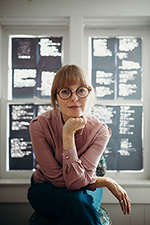 Contributor Manahil Bandukwala talks with one of the two Long Poem Prize contest judges about Jennifer's new chapbook (the product of her 2021 Long Poem Prize-winner, "Legs"), time as the kindest editor, and how a long poem has space to make and unmake itself.
Contributor Manahil Bandukwala talks with one of the two Long Poem Prize contest judges about Jennifer's new chapbook (the product of her 2021 Long Poem Prize-winner, "Legs"), time as the kindest editor, and how a long poem has space to make and unmake itself.
MB: How do you know this is the poem you want to submit? Do you have any practical or intuitive pieces of advice for poets submitting their work to this contest?
JLS: My experience is that a poem will never be totally ready. But it will evolve into a version of itself—full of possibility and disappointment—that might feel it is ready to take some pressure. Maybe if I can love it just enough, then it’s ready? I’m not sure about you, but when I seal the envelope or hit send I instantly hear something that I want to change! Which is always a win, right? Even if it’s uncomfortable—the point is to learn something.
I ask myself things like…Can I locate its heart? Am I ready to learn more about this poem? Is there something in this poem to protect and discover all at once? Is it a poem I can hold in my imagination as its very own world? Can I sense its textures, shapes, colours—does it have physicality? Atmosphere? Motion? If I was a sculptor would I be able to sculpt it? Does it embarrass me just a bit? Does it surprise me every single time I read it and I can’t wait to get to that part I know will surprise me even though I wrote it? Is it raw enough and alive enough and curious enough and uncertain enough? When I read it aloud does meaning spur? Does it bypass logic and land in my chest? Does it make my voice quiver? Not always in the same place.
Meaning is aggregate in a long poem. Atomic qualities of language—sound, rhythm, association—gather and twirl, settle and unsettle into charged arrangement. A long poem has the space to make and unmake itself. It searches. It reaches. It doubles back. It sneaks up on you. My best non-advice is to simply love your process.
Read the rest of Jennifer Lynn Still's interview.